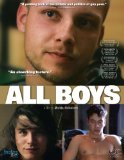| Reviews & Columns |
|
Reviews DVD TV on DVD Blu-ray 4K UHD International DVDs In Theaters Reviews by Studio Video Games Features Collector Series DVDs Easter Egg Database Interviews DVD Talk Radio Feature Articles Columns Anime Talk DVD Savant Horror DVDs The M.O.D. Squad Art House HD Talk Silent DVD
|
DVD Talk Forum |
|
|
| Resources |
|
DVD Price Search Customer Service #'s RCE Info Links |
|
Columns
|
|
|
All Boys
- producer/director Dan Komar
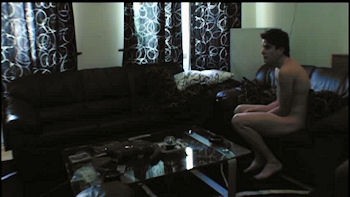
The Movie
If you have even a small amount of knowledge about the gay porn industry (and if you're still reading this sentence, I'm betting you do), I don't need to tell you that Bel Ami is not only the king of Europe, but one of a handful of strongly branded companies that has managed to stay successful for nearly two decades. Founded in 1993 in the Slovak Republic, it built its empire on three pillars: The athletic twink, a model type that became its signature; bright colors; and a sense of fun and frolic. It's a recipe that many others in the industry soon mimicked, resulting in a glut of copycats that flooded (and cheapened) the market. It's into this world that Finnish filmmaker Markku Heikkinen placed his cameras, documenting the lives of a few models and producers that live in the shadows of the more successful company they've tried to emulate.
A narrator sets the stage, nothing that the fall of the Berlin Wall and the subsequent Velvet Revolution ushered in a new freedom of expression--one that Bel Ami founder George Duroy capitalized on, using his "commercial" style with bright lights and colors to create an overnight success. The new models--which at the time represented a fresh new look--grew up under the pressure of socialism and represented "naturalism", hinting at a wild and uninhibited side that helped them become a huge hit in Europe and a huge draw for the Western porn consumer.
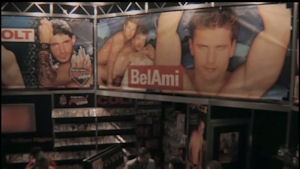
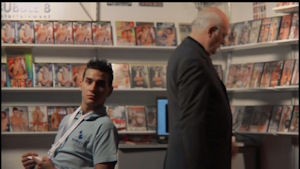
But as we quickly learn, the filmmaker has no interest in the glamour of Bel Ami; this documentary is about the have-nots (an opening clip at a convention teases us with figure skater-turned porn star Brad Patton, an intriguing story that goes unexplored here). As the years passed, the imitators grew--and casting agents went to the gyms, discos and the streets to find fresh meat. The radius had now expanded, reaching beyond the Czech Republic, Slovakia, Hungary and Romania to also include Poland, the Baltic countries and Russia. Caught in dire circumstances, these young men--many of whom identified themselves as straight--viewed this as a rare opportunity for escape, a job that provided a necessary paycheck. While the instant results proved fruitful, the lasting effects of the business--from shame and confusion to drugs and alcohol--are the ones Heikkinen hones in on. These young men are being exploited and swallowed whole by the industry, which is more interested in instant gratification (read: $$$) than career building.
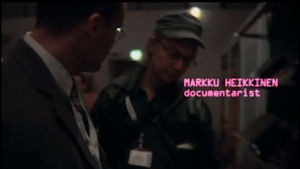
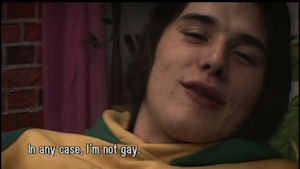
It takes a little time adjusting to the director's style, which is frequently too artsy and heavy-handed. Long lingering shots of the bleak surroundings are effective and fit the film's tone, but become too predictable and obvious after a while (other angles and shots hint at artistic ambitions, like a vase of flowers on a moving train). The subjects and stories here are powerful enough; he doesn't need visual tricks to influence our emotions. All Boys is also pretty disjointed and unorganized--we jump from industry trade shows to film shoots to apartments to the streets without much sense of structure or purpose, the director a little lost within the huge landscape. This film raises a lot of questions but doesn't answer many of them, and it doesn't make the best use of its short 72 minutes.
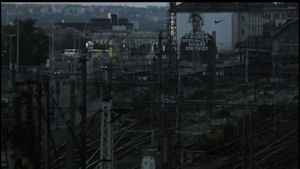
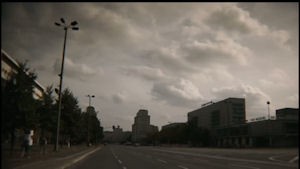
Sequences don't flow very logically (we get a handful of chapter titles like "Business", "New Faces" and "Relationships"), while fleeting descriptors of names and places flash across the screen far too fast. We're often lost here, with Heikkinen doing virtually nothing to support much flow (the segments with porn consumers relating their fascination aren't very strong and feel unnecessary). The narration often feels too large and generic, slapped on in an attempt at forcing some connective tissue: "The rise of porn is linked with industrialism and changes in social and family structure. The porn market could not exist without the birth of the so-called 'free consumer', a free individual on the common market."
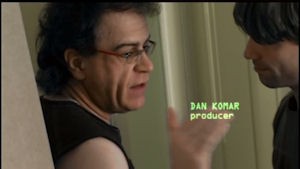
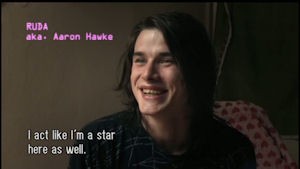
But in an odd way, the film's chaos befits the lives of the people we meet. Even with this structural turbulence working against the film, when the subjects are placed under the microscope the results are often intoxicating. The documentary--like the people it chronicles--is often a mess, but you can't deny its simple power (I can only image the greatness it could have reached if Heikkinen knew how to harness it a little better). A handful of men are the focus, but two take center stage: Dan Komar, a 50(ish)-year-old American director/producer who set up shop in the Czech Republic; and his muse, Ruda (stage name Aaron Hawke), a young and impressionable model in search of a better future: "I grew up in a children's home...I don't want to talk about my family." Komar plucked Ruda up off the streets, naming him after Hollywood star Ethan.
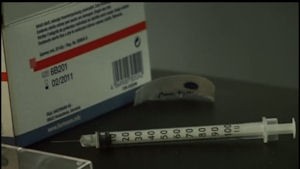

The dynamic between the two is one of dependence and dysfunction. "He's one of the most beautiful male creatures, and we've seen that with sales; he hit a nerve around the world," says Komar, his admiration quickly turning critical: "Those piercing blue eyes, the sharp black hair, the angelic facial features--that have now tarnished a little bit." (Ouch...) The two have also had a tempestuous relationship behind the camera, but you get the sense both are kidding themselves. Asked what he would do if he had a lot of money, Ruda answers, "I'd save...and start a normal life without Dan." Later, his warped sense of reality becomes apparent: "I'm a big star in the States; they could give me some of that money so I could work less. I know I'm a star over there."

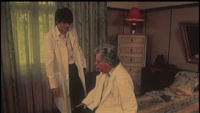
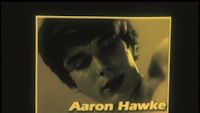
Statements like those truly break your heart. Heikkinen doesn't do much to set context, so viewers not as savvy about the industry may not see the bigger, sadder picture. As time passes in the film, the industry--like the rest of the economy--starts to go south, thanks in large part to the excess of product. That's especially true with the films produced by Komar--the Eastern European athletic twink is one of the most crowded niches in the industry, and chances are if your name isn't Duroy or Higgins, you're an imitator. Komar doesn't seem to see or acknowledge that he's part of the problem; far removed from the Bel Amis and Titans and Raging Stallions, his work (including titles like Bareback Bowling Bonanza 2 and Bareback Ranchers, which have appeared on a few lower-level labels) did things for less, and it showed. It also helped usher in the explosion of condom-free product, one of the most highly contentious and controversial subjects that the gay adult world faces.
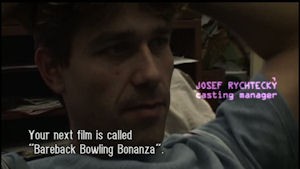
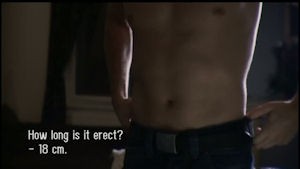
"For better or worse, I'm being blamed--acknowledged--as the person who brought bareback back to Prague," he says, almost proudly nothing that his company was the first to do a full bareback movie and the first to film a bareback double penetration (facts that are hard to check). "And then everybody jumped on the bandwagon over here, and hardly anything is made over here with condoms." Sadly, that's as deep as Komar and Heikkinen delve into the issue, the film's biggest crime. What does Komar think of bareback detractors? How does he answer claims of irresponsibility in regards to the models and impressionable consumers? And what do the models have to say about it? This intense debate is completely ignored, which is almost unforgivable (the director also never tackles the issue of how these supposedly straight models can have sex with men, another fascinating issue).
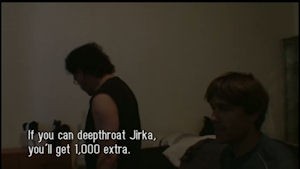
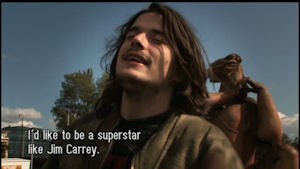
Komar proves to be a fascinating subject; he serves as a reality check on Ruda, but no one is here to do the same to the director. Nonetheless, his own words and actions speak volumes, whether he's speaking about his motivation or his potential future with Ruda, or when he's dangling money over a model's head in a deep-throat challenge on set. (Also watch for a memorably awkward casting couch session between manager Josef Rychtecky and an aspiring actor.)

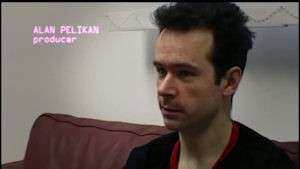
Producer/director Alan Pelikan (a former model, his work as a director has appeared under the U.S. Male label) also doesn't have much to say on the taboo subject ("Bareback movies have become popular lately, so I have to make them as well"), but he doesn't seem to care: "It's work. It's how I make a living," he says, later seen injecting a model's penis before a scene. "There will always be somebody doing it for less." The film's most memorable shot finds the director at his desk, a naked male model sitting on a chair awaiting his call to camera. To the right is the director's wife, attending to a crying infant on the set. It's one of those jaw-dropping moments that make me all the more incredulous given quotes like this: "Health is always on my mind because I have a family. I insist on very good hygiene," Pelikan says, apparently equating "health" with grooming. You can't script a more shockingly diametric combination of words and images, which floored even jaded, unshockable me. You know he's doing what he does out of necessity and love for his family, but at what expense?
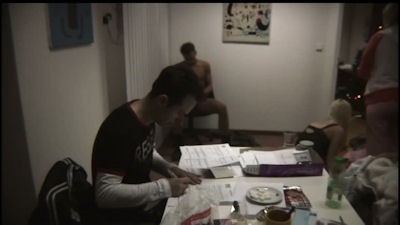
Also breaking your heart is model Josef (a.k.a. Joey Motell) and his mother Irena, a kind woman who tried her best to raise her son under difficult conditions. She knows what he does for a living, and she can't do anything about it. There's a sense of resignation and defeat on her face, but there's also genuine love. It's a complicated relationship, and perhaps the film's most honest and powerful sequence: "I don't know if he is still doing it. And I don't know what my reaction would be. Probably nothing. He's my son, and although I don't like what he's doing--and let's be frank, I'm not too happy about it--but we forgive our children anything."
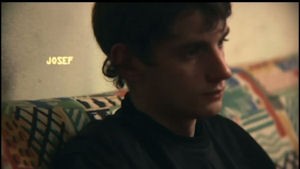
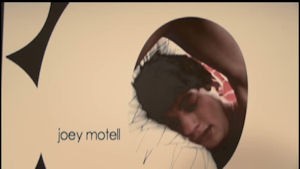
Also chiming in is Lenka, the model's girlfriend: "If he wanted to return to it...I don't know if I could accept it. I don't know. Probably not," she confesses, seated next to him. (The exchange becomes even more telling when Josef plays devil's advocate...this is a complicated situation that virtually none of us can appreciate.) I could watch a whole documentary on just these subjects; their faces alone say so much. All Boys would have benefitted from more time with them.
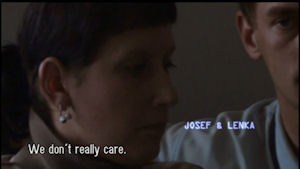
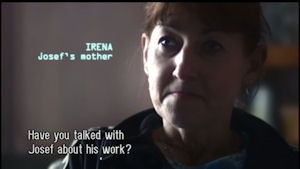
We meet a few other people along the way, but nothing substantial. You get the sense Heikkinen filmed a lot of footage and pieced it together, figuring the topic was juicy enough to hold your interest. If so, he was right to a degree. By the time the film winds down, we catch up with Komar and Ruda again--and the result is so tragic I almost didn't believe it was real (sitting alone in my living room, I actually asked that question out loud). We see first-hand what happens to a lost young man in desperate need of love and validation, how he is bought and sold as a commodity in a ruthless industry. You get the sense that this poor kid will never stop being exploited--and you'll wonder if Heikkinen is just as culpable. And while I question some of the director's choices, watch for the convention sign he captures at the end of the film--a fitting message that possibly holds the key to happiness for these lost souls. All Boys feels unfinished and incomplete, but it sticks with you and ignites some heated--and necessary--debates.
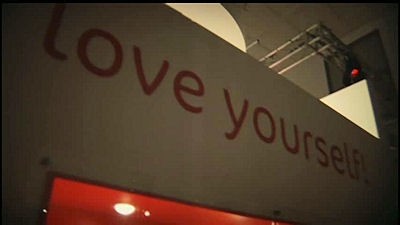
The DVD
Video:
The 1.78:1 anamorphic image, like the film's tone, is pretty grim and dark--but it's a low-budget documentary with low-budget cameras filmed under the grey clouds of Eastern Europe, so that's okay. Little detail, clarity or sharpness here (and colors are drab), but it's intended to look that way and doesn't detract from the sometimes powerful words and images.
Audio:
The Dolby Digital 2.0 track suffices just fine, never really impressing but never disappointing to any huge degree. We get a range of English, Czech and German speakers, with forced English subtitles for the foreign languages (although I could have used some subtitles for the spots where Ruda speaks in very broken English).
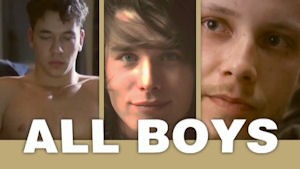
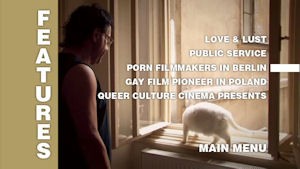
Extras:
Like the feature, the extras could have benefitted from more structure, but some truly moving moments will reward patient viewers. Up first is Love & Lust (26:55), which expands upon one of the themes in the documentary. It interviews four German men about their sexual awakenings and connection to porn (we get moments with one of them--Peter--near the end of the main feature). The biggest problem is made clear from the start: The subtitles are screwed up. Not only do they have some misspellings and awkward translations, but they're also frequently timed improperly--sequences of silence have non-stop subtitles, and it's hard to discern who is saying what much of the time. I was able to pinpoint how far off the subtitles were when I recognized (what I assumed was) the German word for "fisting" (cause, you know, it sounds just like "fisting"), which appeared in the subtitles moments later. Say the filmmakers:
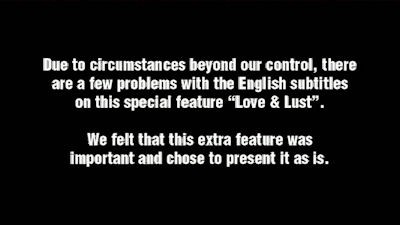
That leads to some unintentionally funny moments, like this passage--which quickly goes from poignant to hysterical: "My hesitation is, the more unsatisfying sex that I have, the more sex I will want to have, and I think that's a very unhealthy development. I would rather have very good sex every four weeks in which I can...how is it called? How can I describe this and give it justice? It's like a freshly fucked squirrel that's finally found its nut. The other way, I'd have much more than 10 dicks in half a day in my behind." (Making this even more memorable? He shares this in a public park, a young child coughing in the background.)

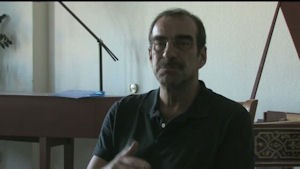
There are some interesting stories here--some of these men are married, some embrace their addiction--but the director once again opts for a more stylized presentation when a more straightforward one would have been better. This moves a little slower than the other extras and is the least satisfying; still, it's interesting enough if you can get past the technical difficulties.
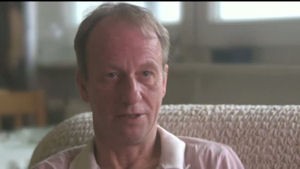

Up next is Public Service (29:23), a short documentary filmed in Prague in 2007 and 2008. It takes a while to get comfortable, but once it does it's a fascinating watch that once again had me staring at the screen in disbelief. The director alternates two different stories--we start at a shelter run by the Sance Project, a comprehensive social service and humanitarian program aimed at aiding sexually abused children and young adults. The house we are invited into is run by a kind yet wisecracking man named Laszlo, who tries to help "the forgotten" get back on their feet through providing shelter, aiding with work, therapy and (sadly) a comforting hand to hold during hospital trips. "Only those who used to have a better life realize that they need help," he says, noting many of the young men he helps come from abusive homes. Laszlo also notes that many strangers on the streets--having recognized him from the press the Project has received--shun him for working with "human garbage".
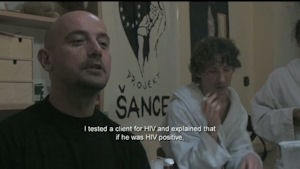
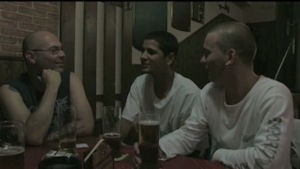
That story is intercut with the pursuits of Rick, an (I'm assuming) American who has set up a career for himself in Prague as a modern-day pimp. Camping out at train stations, he cruises for potential boys to work for him: "If you say 'business' anywhere in the station--or I would assume anywhere in the Czech Republic--to a boy, he knows that you mean sex business. At the end of the day, as a straight kid, they've had sex three times a day with men, and they may not like it--and I'm almost sure that they don't." With his cell phone constantly at his side, he arranges for boys to meet up with clients across Europe, his commission coming solely from the johns.
He invites some of his workers to stay with him, including Marek: "My home is Rick's gypsy house. Without Rick, I would live on the street. I would freeze and rot. He has helped me a lot. I like Rick." (One scene have the two and another young man drinking in a bar, the European boys singling loudly to the Backstreet Boys' song "Show Me the Meaning of Being Lonely"...a moment the director couldn't have dreamed up any better). But even with those words of praise, your stomach might turn a little seeing Rick in action--whether it's watching a video of his own sexual encounters with his "boys" (and criticizing one's body in the process) or watching him keep his eyes on a potential new hire in the station. And when the film jumps 10 months ahead, the payoff is unforgettable--including quotes from Rick and his sister that serve as a perfect punch/counter-punch of emotions, one of the most powerful parts of this entire disc.
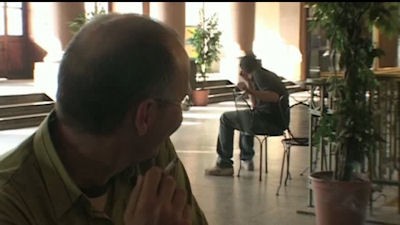
Porn Filmmakers in Berlin (15:15) interviews producers/directors Jurgen Bruning and Kiki, who both speak excellent English. Bruning co-founded the very successful Cazzo Films in 1996 before creating his own studio, Wurstfilm, in 2003. This featurette is meant to provide a contrast to the gay porn industry in the Czech Republic, where Bruning notes that most studios use gay-for-pay models and create a cheaper product in general. "I'm kind of astonished when I see 19-year-old guys in Prague fucking without a condom...this is unresponsible," he says, adding that he doesn't want to be a sugar daddy or live with his models, and he treats them like actors. "It's more like slavery."
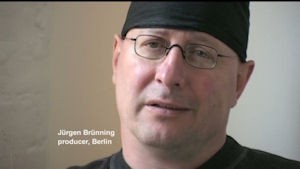
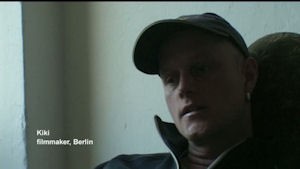
The producer briefly touches upon the bareback issue, but once again the director seems to fumble an opportunity to probe deeper: Bruning notes that the bareback content Wurstfilm produces is made with older, HIV positive men, drawing a distinction between his kind of product and the Czech efforts he criticizes. Agree with him or not, it certainly opens the door to a bigger discussion the film shies away from. Kiki is equally engaging--he likens his job to working in a hospital, sharing how "dirt" (a euphemism, no doubt) falls down onto his camera while he's filming low-shots of penetration. "I would not like to work in straight porn. I don't agree with the role models there. Straight men really don't want to see a very active woman; they just want to see them very passive. I can't deal with that." Minute for minute, this is the strongest extra here; it wastes little time, and also shares more interesting food for thought.
Up last is Gay Film Pioneer in Poland (10:20), which talks to a producer named Slavek. He notes that porn was forbidden in the country until 1997, and talks about the climate in the country toward the industry and gays in general. The most eye-opening footage comes from the country's first gay pride parade in 2005, where the number of police guards and protesters is staggering. "We are north...the bigger problem than Catholicism is the climate, because we are nearly like people in Scandinavia. We drink a lot of alcohol and we don't have good sex." He has some interesting theories about the future of sex with the rise of the internet, and also notes how disenchanted young gay men can become by trying to measure up to unattainable ideals. He's an interesting guy who seems to easily amuse himself, just a few of the reasons this is a worthwhile watch.
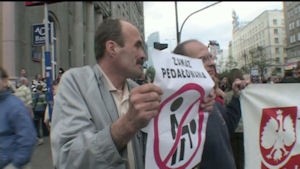
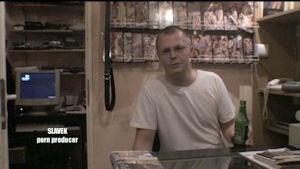
Trailers for other Breaking Glass releases round it out.
Final Thoughts:
Like the lives of the people it documents in the gay porn industry, All Boys is sometimes a mess. Often lacking focus, it jumps around and gets lost amid its "bigger picture" ambition. It's frustrating that the director often seems more concerned with style, a real shame considering all of the raw substance here. Technically as a film, it has its faults. But that doesn't lessen the impact many of its subjects and sequences have. When we get to just listen to some of these people talk, you can't deny the film's power. An often unsettling sense of defeat, hopelessness, fear and sadness permeates the proceedings as the dysfunctional and co-dependent lives of the young models and their producers unfold. All Boys could have been much better if it focused (and expanded upon) its most compelling subjects, which nonetheless still save the film from its problems. While it doesn't answer many of the questions it raises, it certainly fuels fire on some controversial topics. A solid set of equally erratic yet intriguing extras makes this Recommended for gay porn documentary fans (and hey, aren't we all?). Everyone else should Rent It for a flawed yet fascinating look inside an often ugly industry.
|
| Popular Reviews |
| Sponsored Links |
|
|
| Sponsored Links |
|
|
| Release List | Reviews | Shop | Newsletter | Forum | DVD Giveaways | Blu-Ray | Advertise |
|
Copyright 2024 DVDTalk.com All Rights Reserved. Legal Info, Privacy Policy, Terms of Use,
Manage Preferences,
Your Privacy Choices | |||||||









